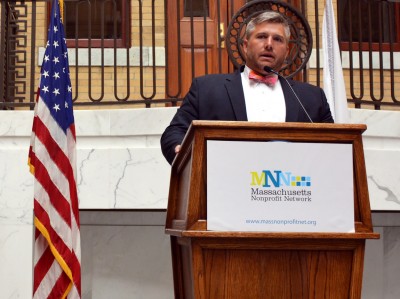
As the possibility of hosting the Summer 2024 Olympics looms over Boston, not everyone is excited for the hundreds of thousands of tourists that could be drawn to the city and the costs of the biennial mega-event.
“It is a concern because there’s only so many dollars to go around,” said Kelley Gossett, a co-chair of the organization No Boston Olympics, which works against the city’s Olympic bid. “We think it’s really important to keep this topic in the news and to provide an alternate view.”
The United States Olympic Committee chose Boston as the U.S. bid for the Summer 2024 Olympics on Jan. 8, The Daily Free Press reported. The International Olympic Committee will choose a host city in 2017.
Gossett and her colleagues are concerned the temporary Olympic bliss could offset major costs to the host city, especially in the nonprofit sector. The Boston games would be primarily privately funded, she said, hence the concerns that it could affect necessary nonprofit donations as more donors funnel funds toward the games.
All that, she said, doesn’t look at the issues of sustainability and other long-term effects the games could have on Boston. Where would the Olympic park go? What would its use be after the games are finished? Would the surrounding neighborhoods be negatively affected?
What’s more, Gossett said, is that “every Olympics goes over budget,” with taxpayers usually footing the bill. The last Summer Olympics cost the United Kingdom $14.6 billion, well beyond the initial budget of $4.4 billion, The Guardian reported on Oct. 23, 2012.
“There’s so many worthy causes in this city and this region that deserve attention as well, but to raise private dollars for a three-week event that does not yield economic benefits … that’s unfortunate,” Gossett said.
Rick Jakious, CEO of the Massachusetts Nonprofit Network, has a more positive outlook.
“People flex to support things and rally around things,” he said. “There’s definitely elasticity in charitable giving. The question is whether there might be a redistribution of resources that are currently going to existing needs.”
The Massachusetts Nonprofit Network represents the needs and interests of all nonprofits in Massachusetts, and Jakious said he intends to see it do so in all future talk of the Games.
“Our primary concern is to make sure that nonprofit organizations have a seat at the decision-making table,” he said.
The main issue, he said, is recognizing a donation drop could happen and then working to prevent it beforehand.
“If it’s not part of the public dialogue, then the chances of that happening increase,” he said.
Gossett also emphasized the need for an accessible, transparent and public discussion. The Boston 2024 website has posted information regarding public community meetings running that started in February and run until September, as well as video recordings of their closed meetings.
“There’s just so many different wrinkles to it, and we just ask for a really transparent process,” Gossett said. Her organization’s website also strongly advocates for people to get involved and has listed the Boston 2024 public meeting times as well.
To move forward, Jakious said a public dialogue is essential because of how many factors are involved in this effort.
“Again, I’m not presuming [the bid] will move forward, but that’s the best way to ensure that if it does move forward, that we have thought about and developed some sort of idea and ideally some sort of consensus on how to leverage the Olympics to benefit all those important areas,” he said. “At the end of the day, the Olympics are about spotlighting the amazing city that Boston is, but also about spotlighting the amazing city that Boston wants to be, and all of those discussions are critical parts of that.”


























































































































